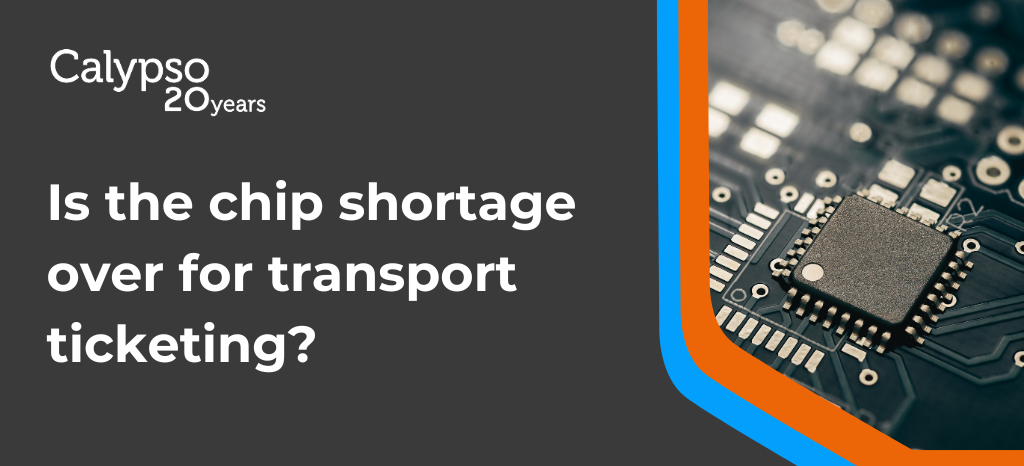
Is the chip shortage over for transport ticketing?
- By Vappereau Philippe
- In
Philippe Vappereau, General Manager of Calypso Networks Association (CNA), assesses the current state of the global chip shortage, calling for networks to ensure they diversify the semiconductors they use and the manufacturers they source them from, or face the inherent risks of depending solely on one offer.
The global pandemic may seem a distant memory to some. But to many others, its effects live on. In the transport sector, passenger numbers have yet to return to pre-pandemic levels, with passenger behaviours and travel patterns now significantly harder to predict in the long term.
The shutdown of supply chain infrastructure, including semiconductor / chip manufacturing plants, caused a global chip supply shortage that hit multiple industries worldwide: most notably the electronics and automotive industries, but also the payments world and of course, transport ticketing.
Is this shortage now at an end?
Generally speaking, we are through the worst of it. Supply has returned once again to sufficient levels. But it doesn’t mean things are back to normal.
Technology moves on, and transport ticketing must move with it. Proximity cards like a Calypso smartcard or an EMV® Chip card are based on the ISO/IEC 14443 standard. Within this standard, cards can be either Type A and Type B:
- Type A cards were initially lower cost, memory-only cards
- Type B cards were higher end, higher security microprocessor cards
Over time, these differences have largely disappeared, but both types of protocols continue to exist.
A great many transport ticketing cards are what we would still call Type B cards. But the banking industry largely uses Type A for payment cards. These chips are used and therefore manufactured in vast quantities: according to EMVCo, nearly 13 billion chip cards are currently in global circulation – a number that continues to rise.
This means that an overwhelming volume of chip cards produced each year use the Type A protocol. Transport operators and authorities can therefore benefit from economies of scale in the manufacturing process, if they take steps now to adapt their terminal software to accept both types of proximity cards.
Getting ready might be easier than you think
The good news is that this evolution only requires, in most cases, a software update to existing terminals in order to accept both types. Already, we are seeing forward-thinking public transport networks in Mexico City, Lisbon and Paris make the modifications needed to accept both A and B type chip card protocols for passenger payments.
Technologies such as Eclipse Keyple make it easier than ever to do so. As an open API, Keyple facilitates the development of low-cost, advanced, compliant smart ticketing software for terminals. We designed and developed this SDK with the Eclipse Foundation, donating it to the ticketing community to help you evolve freely and implement solutions without proprietary constraints.
Functions within the Keyple library enable developers to create solutions immediately compatible with both Calypso and proprietary terminal specifications, and can help efficiently enable acceptance of A-type and B-type chips. Keyple significantly lowers the time and cost to develop and integrate infrastructure upgrades, releasing resources to focus on improving the passenger experience.
Future-proof solutions for long-term sustainability
Calypso Networks Association also works with multiple semiconductor providers, rather than one proprietary vendor. In doing so, it further enhances availability of supply, as well as promoting competition, which provides supply chain agility and keeps costs down for Public Transport Operators and Authorities.
In the years ahead, more A-type chip cards will be produced for the banking sector, and fewer B-type cards will be made. To keep costs down, CNA encourages its members and the wider transport ticketing community to adapt their terminal software infrastructure to accept A-type as well as B-type.
Economically, this could result in significant financial savings, as well as offering faster processing speeds, helping throughput in busy terminals, and offering more opportunity for additional value-add services to be accessed on smartcards, such as retail loyalty schemes or access control.
As the chip shortage crisis continues to ease, we must as an industry learn its lessons: the need for resilience, forward-planning and most importantly: choice. PTOs and PTAs that depend on one type of chip from one manufacturer leave themselves at the mercy of market forces. It’s time to ensure your software setup is flexible enough to adapt for different hardware without needing an entire overhaul.
At CNA, our aim is to simplifying ticketing for all players, whether users or suppliers. Our community exists to encourage collaboration and innovation, with operators and authorities always at the heart. Only by cutting complexity and enabling mobility for all can we do enough to persuade users out of individual cars, encouraging them instead onto attractive, sustainable public transport services.
Find out more about Calypso’s Card offer and get in touch with our team to see how we can help you lower costs through dual semiconductor sourcing.

